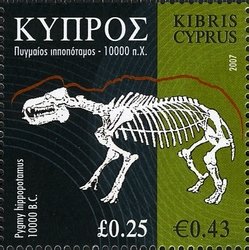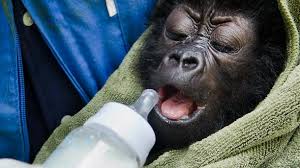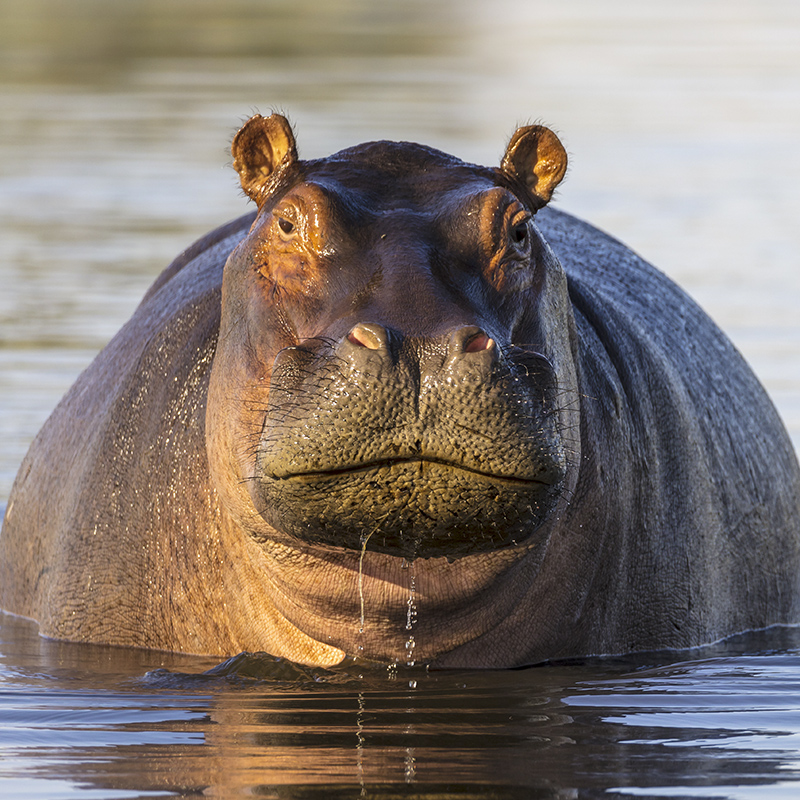Stamp: Pygmy hippopotamus (10,000 B.C.) (Cyprus 2007)
Pygmy hippopotamus (10,000 B.C.) (Cyprus 2007)
02 October (Cyprus ) within release Cyprus Through the Ages goes into circulation Stamp Pygmy hippopotamus (10,000 B.C.) face value 0.25 Cypriot pound
| Stamp Pygmy hippopotamus (10,000 B.C.) in catalogues | |
|---|---|
| Michel: | Mi:CY 1108 |
| Stanley Gibbons: | Sg:CY 1137 |
Stamp is square format.
sheetlet with eight different stampsAlso in the issue Cyprus Through the Ages:
- Booklet - Cyprus Through the Ages face value 3.44;
- Stamp - Pygmy hippopotamus (10,000 B.C.) face value 0.25;
- Stamp - Stone vessel (7000 B.C.) face value 0.25;
- Stamp - Choirokitia settlement (7000 B.C.) face value 0.25;
- Stamp - Female figurine (3000 B.C.) face value 0.25;
- Stamp - Terracota vessel (2000 B.C.) face value 0.25;
- Stamp - Greek inscription on bronze skewer (1000 B.C.) face value 0.25;
- Stamp - Bird shaped vessel (800 B.C.) face value 0.25;
- Stamp - Map with Ancient Kingdoms of Cyprus (1718) face value 0.25;
Stamp Pygmy hippopotamus (10,000 B.C.) it reflects the thematic directions:
Mammals are any vertebrates within the class Mammalia (/məˈmeɪli.ə/ from Latin mamma "breast"), a clade of endothermic amniotes distinguished from reptiles (including birds) by the possession of a neocortex (a region of the brain), hair, three middle ear bones and mammary glands. All female mammals nurse their young with milk, secreted from the mammary glands. Mammals include the largest animals on the planet, the great whales. The basic body type is a terrestrial quadruped, but some mammals are adapted for life at sea, in the air, in trees, underground or on two legs. The largest group of mammals, the placentals, have a placenta, which enables the feeding of the fetus during gestation. Mammals range in size from the 30–40 mm (1.2–1.6 in) bumblebee bat to the 30-meter (98 ft) blue whale. With the exception of the five species of monotreme (egg-laying mammals), all modern mammals give birth to live young. Most mammals, including the six most species-rich orders, belong to the placental group. The largest orders are the rodents, bats and Soricomorpha (shrews and allies). The next three biggest orders, depending on the biological classification scheme used, are the Primates (apes and monkeys), the Cetartiodactyla (whales and even-toed ungulates), and the Carnivora (cats, dogs, seals, and allies).
Animals are multicellular, eukaryotic organisms of the kingdom Animalia (also called Metazoa). All animals are motile, meaning they can move spontaneously and independently, at some point in their lives. Their body plan eventually becomes fixed as they develop, although some undergo a process of metamorphosis later on in their lives. All animals are heterotrophs: they must ingest other organisms or their products for sustenance.
The hippopotamus (Hippopotamus amphibius; /ˌhɪpəˈpɒtəməs/; pl.: hippopotamuses), often shortened to hippo (pl.: hippos), further qualified as the common hippopotamus, Nile hippopotamus and river hippopotamus, is a large semiaquatic mammal native to sub-Saharan Africa. It is one of only two extant species in the family Hippopotamidae, the other being the pygmy hippopotamus (Choeropsis liberiensis or Hexaprotodon liberiensis). Its name comes from the ancient Greek for "river horse" (ἱπποπόταμος).
An anniversary is the date on which an event took place or an institution was founded in a previous year, and may also refer to the commemoration or celebration of that event. For example, the first event is the initial occurrence or, if planned, the inaugural of the event. One year later would be the first anniversary of that event. The word was first used for Catholic feasts to commemorate saints. Most countries celebrate national anniversaries, typically called national days. These could be the date of independence of the nation or the adoption of a new constitution or form of government. The important dates in a sitting monarch's reign may also be commemorated, an event often referred to as a "Jubilee".




